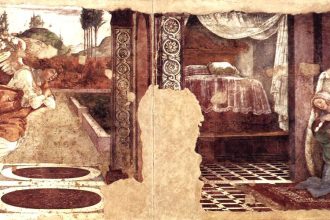 Augustine occupies a unique place in the history of theological aesthetics. In a sense, the whole of Western theological aesthetics is couched in Augustine’s complex struggle to understand how the things of the body (sensuality, art, imagination, etc.) should be properly ordered in relation to God.
Augustine occupies a unique place in the history of theological aesthetics. In a sense, the whole of Western theological aesthetics is couched in Augustine’s complex struggle to understand how the things of the body (sensuality, art, imagination, etc.) should be properly ordered in relation to God.
On the one hand, Augustine is the great theologian of desire. Our whole being yearns after a God who alone can satisfy our desires for goodness, beauty and truth. The material things of this world may not ultimately satisfy us, but knowledge and pleasure gained through the senses are still valuable because they are a gift from God and they point us toward the source of that gift.
On the other hand, Augustine is also a theologian of transcendence. God is always beyond the knowledge and pleasure acquired by our senses. The many passions and appetites of our bodies fragment us, pulling us in multiple directions, and, for Augustine, the spiritual life is about seeking refuge in a God who brings wholeness and peace.
For the purposes of this brief reflection, I would like to draw your attention to the more negative aspects of Augustine’s theological aesthetic in his Confessions. Augustine is sometimes cited, by those more inclined to enjoy the arts, as one wary of the dangers of the arts. It is not hard to find quotes such as:
Why is it that men enjoying feeling sad at the sight of tragedy and suffering on the stage, although they would be most unhappy if they had to endure the same fate themselves? Yet they watch plays because they hope to be made to feel sad, and the feeling of sorrow is what they enjoy. What miserable delirium it is! (III.2)
…I look upon food as medicine. But the snare of concupiscence awaits me in the very process of passing from the discomfort of hunger to the contentment which comes when it is satisfied. (X.31)
For the senses are not content to take second place. Simply because I allow them their due, as adjuncts to reason, they attempt to take precedence and forge ahead of it, with the result that I sometimes sin in this way but am not aware of it until later. (X.33)
To contemporary ears, Augustine’s reflections on sensual pleasure may sound quaint and ridiculous, or, worse, they may give one the impression that Augustine views the body as a source of evil. While Augustine does grant a certain primacy to the mind over the body, his views are more nuanced and careful than they may at first appear. Let me offer three reasons why we need to listen carefully to Augustine’s reflections on the senses.
First, Augustine is not saying that sensual pleasure is bad, but that it is a mixed good. As his Confessions so clearly show, Augustine is painfully aware of how easily he can take something good and turn it into something bad. In a world increasingly obsessed with becoming a “safety state” that eradicates the possibility of danger and violence, we need to heed Augustine’s reminder that, until death is finally swallowed up in victory, we live in a world mixed with good and evil.
Second, Augustine is not saying that sensual pleasure is as tempting for everyone. In his Confessions, he seems aware that he, particularly, struggles with temptations that arise from sensual pleasure. He writes about them as though, unless he is careful, he would lose himself in a world of beautiful appearances. To lesser or greater degrees, we may be like Augustine in this regard. So many aspects of our world today are a glutton’s paradise, and Augustine knew that gluttony was a problem for him.
Third, and finally, Augustine is not saying that sensual pleasure is bad because of the senses. He worries about the temptation of sensual pleasure because he knows himself. This, I think, is one of the most powerful lessons we can learn from Augustine’s Confessions, and, specifically, from his reflections on the body and sensuality. Augustine’s fear that the senses might take control, his anxiety over losing himself in sensual pleasure, is well founded in a humble and courageous examination of himself. I do not believe that Augustine’s Confessions are meant to make us fear or hate sensual pleasure, the body or the arts. They are an encouragement to look deeply into ourselves (body and all), and in the messiness of our lives to find the grace of God.
Image Credit: Antonello da Messina, St. Augustine, 1472. Public Domain. Wikipaintings.





